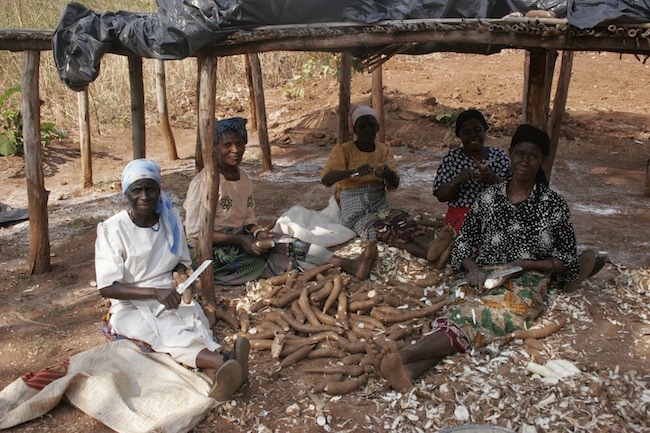Over 90,000 of the world's poorest farmers, many of them women living on less than a dollar a day, are taking advantage of new opportunities to increase their incomes, thanks to the C:AVA (Cassava: Adding Value for Africa) project, an ambitious international collaboration led by the Natural Resources Institute (NRI).
NRI and its major partners in five African countries have developed a network of 103 organisations, both public and private, who are working together to enable small-holders to gain more income through value addition to their principal crop, cassava.
The problem being addressed
This starchy root vegetable is an important staple food, relied on by millions in sub-Saharan Africa. Drought resistant, it thrives on poor soils with little need for fertilisers or pesticides, so is widely grown. Prices, however, can be very low, as the fresh roots have a short shelf-life and are difficult to transport.
Innovative solution
Backed by the Bill & Melinda Gates Foundation with a $16.6 million grant, the project, known as C:AVA (Cassava: Adding Value for Africa; http://cava.nri.org ), has been conducting innovative work to boost the income farmers can get from their harvests. A new video that introduces the C:AVA project can be found here.
Based on previous UK and EC-funded research with the principal partners, the project links smallholders to national and international markets by supporting small and medium scale processing enterprises which turn their cassava into high-quality processed flour. This product is sold at premium prices as an alternative to expensive imported wheat flour and starches.
Key activities in the project include:
· Helping farmers boost their productivity and secure a consistent supply of high quality cassava. Supplies of new high-yielding varieties of the crop have been made available and farmers trained in new labour-saving cultivation techniques have been taught.
· Enabling farming households to add value to their cassava, by grating and drying it at home or in local processing facilities. The project provided training and support to buy new and better equipment.
· Supporting small and medium scale private sector companies. These fill a key role in the supply chain by buying fresh and dried cassava from smaller producers, turning it into flour and marketing it to manufacturers to meet larger orders. Training has been provided in business planning, negotiating and quality management.
· Developing markets for high quality cassava flour (HQCF) as a versatile raw material. Marketing and promotion has been carried out, with demonstrations for manufacturers on how to use cassava flour as a full or partial replacement for wheat flour.
Demonstrable success
Already, the project is achieving great results in all five countries. Cassava flour produced as a result of project activities is being used in baking, food manufacture and the production of paperboard and plywood. Just this year alone 3,000 tonnes of flour, worth ca. $1.9 million, was used by the plywood industry in Ghana. More than 18,500 tonnes (estimated value $9.3 million) was purchased by flour millers in Nigeria. In addition to cassava farmers, more than 4,000 community processors are also benefiting.
As the project continues, we are delighted to announce the production of a new video, which gives an excellent introduction to C:AVA and includes interviews with all the country managers. We have also refreshed the website with a new design and structure, stories of success and technical information on HQCF and cassava drying.


